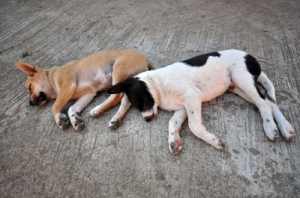In a previous post I discussed how to care for your senior cat. Now let’s look at ways to care for a senior dog.
At approximately six years of age, large breed dogs are considered geriatric and tend to have shorter life spans.
A 7 year old small dog is equivalent to a human aged 44-47, and for a large breed dog that age is 50-56.
At 20 years those numbers are 96-105 and 120 years, respectively, for small and medium breed dogs.
Senior dogs can become afflicted with many of the same problems as you and I in our older years. Some of which are:
- Cancer
- Heart disease
- Kidney and/or urinary tract diseases
- Liver disease
- Diabetes
- Joint or bone disease
- Senility
Here are some things to consider when caring for an older pet:
To detect and treat signs of illness or other problems, geriatric pets should have semi-annual visits. They are more in depth than the annual visits for younger pets.
Geriatric pets should have foods that are more easily digested. The diet should also consist of different calorie levels, ingredients, and anti-aging nutrients more than is necessary for a non-senior pet.
The health risks increase when geriatric dogs gain weight. However with cats, the bigger concern is weight loss.
Because older pets may show signs of senility, stimulating them through interactions can help keep them mentally active.
Senior pets may need adjustments to their daily lifestyle. Changing sleeping areas to avoid stairs is one thing to keep in mind.
In the local area where I live, if you adopt a pet from a local shelter they must be spayed/neutered before you are allowed to take them home. If you rescue a pet that has not been altered please have the procedure done immediately. There are many low cost local clinics that provide the service and non-spayed/neutered dogs and cats are at a higher risk for several types of cancers. Breast and testicular cancers are largely preventable by spaying and neutering. Approximately half the deaths of pets over 10 years of age are caused by cancer.
Common Signs of Cancer in Pets are:
- Persistent, abnormal swellings that continue to grow
- Sores that are not healing
- Weight loss
- Loss of appetite
- Any body opening that has discharge or is bleeding
- Offensive mouth odor
- Difficulty with eating or swallowing
- Difficulty with breathing, urinating or defecating
Behavior changes can serve as an important indicator that something is changing in an older pet, sometimes before any medical signs are apparent.
According to the American Veterinary Medical Association, the following are possible behavior changes in older pets:
- Increased vocalization
- Confusion
- Disorientation
- Decreased interaction with humans
- Increased irritability
- Increased anxiety
- House soiling
- Decrease in self-hygiene/grooming
- Increased wandering
- Change in sleep cycles
In the early 1990s studies conducted were the first to identify brain changes in older dogs that were similar to brain changes seen in humans with Alzheimer’s. There is a chance your pet may be experiencing cognitive dysfunction so it is important to have your veterinarian rule out any underlying diseases or causes.
If your pet seems to be in pain and isn’t as active as you think they should be have your veterinarian examine him for the possibility of arthritis. You may see one or more of the following signs if your pet has arthritis:
- Favoring a limb
- Difficulty sitting or standing
- Sleeping more often than usual
- Joints that appear to be stiff or sore
- Not as eager to jump, run or climb stairs
- Weight gain
- Loss of interest in playing or general decreased activity
- Increased irritability or other behavior changes
- Being less alert
If your pet seems to have any of these symptoms for more than two weeks, it is best to have your veterinarian examine them, because signs of arthritis are often similar to signs of normal aging. Arthritis treatments for pets is similar to those for humans.
Some over-the-counter medications can be fatal for pets, so please do not give human medications to your pet without first consulting your veterinarian.
Peace and Love are present in my world now,

![]()






